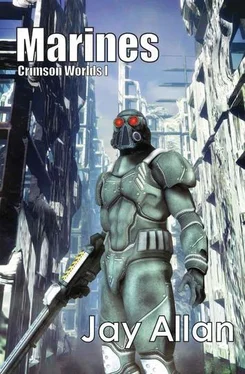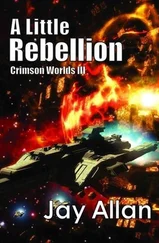The trip was hard on a lot of our class. None of us had ever been in space, and the zero gravity and acceleration periods were rough on the digestive system. Cleaning up partially digested rations in a zero gravity environment might have been my least favorite part of training. We did have a number of methods though, and we got quite good at it.
I'd read an account of a sailor from the old wet navy who said that recruits got used to the waves and that their seasickness passed in a couple weeks. Well, I can tell you that it takes longer than two weeks in space, but the principal still holds. By the time we made our third jump and entered the Van Maanen's Star system, most of us had adapted to normal space travel. We'd get another chance to acclimate to the wild maneuvers preceding an orbital insertion, but that pleasure was still a few months away.
The next two years were filled with training similar to what we'd had already, but in increasing difficult and dangerous circumstances. We practiced on Van Maanan's 2, but we also did maneuvers on the sun-baked first planet and on a moon of the seventh planet where the temperature hovered a balmy 40 degrees above absolute zero.
We let loose with all of our weapons, and in year six we trained with the "specials." Unleashing nuclear warheads was dangerous business, and you certainly didn't want to undershoot with one.
We didn't have any washouts after we left Earth - they'd weeded out all the losers long before. But we did have casualties. Those last two years cost us 102 dead, and my class ultimately graduated 382 out of 1,011 who started.
We got a trip back to Earth for graduation. When we got there they gave us two weeks of leave and transport anywhere in the Alliance. I didn't have anyone to visit or any real desire to see New York again, so I just went to New Houston. That's what most of the class did. The marines seemed to seek recruits with no real ties or family.
Graduation was held on the parade ground at Camp Puller. General Strummer had been true to his word. We not only saw lots of blue full dress uniforms - we got our own. Strummer wasn't there, though. There had been a lot of skirmishes along the frontier, and the general had been transferred to a sector command.
There was a lot of satisfaction in having finished six years of hard training. My life before joining up felt like some bizarre dream, and I could hardly form clear memories of that time. This was my life now.
My class had been together for a long time, and I think we would have liked to serve with some familiar faces, but new recruits were generally assigned in small numbers to existing commands. We got parceled out to units all over Alliance space, and I was the only one sent to my new company.
A week after graduation I boarded a transport, and two months later I got bolted into a lander and blasted out into the upper atmosphere of Carson's World. It was the beginning of a long journey.
Tau Ceti III During Operation Achilles
“Cain, pull your troops back to the refinery. Fast. The whole company’s falling back.” Sergeant Barrick’s voice. Great. That meant that all the officers were down.
I snapped out a series of orders to my acting fire team leaders, telling them to retreat in hundred yard intervals, one team covering the other while they fell back. Between the smoke and the confusion I couldn’t be certain, but my best guess was the company had already lost about half its strength.
We were in the middle of Operation Achilles, the invasion of Tau Ceti III. That may have been its official name, but to us it was a fucked up mess, colloquially known as the Slaughter Pen.
It was my seventh mission since the Carson’s World assault and I’d made the last three as assistant squad leader. A few days earlier an enemy frag grenade had made me acting squad leader. Sergeant Thompson wasn’t dead, but with both legs blown off he wouldn’t be leading the squad anymore either.
By this time the undeclared war we’d been fighting for fifteen months had become official. The Third Frontier War had begun in earnest, and we’d been pretty roughly handled so far. We’d lost two major land battles and a half-dozen mining colonies, and the navy had suffered a pretty serious defeat at the Algol warp gate. With the fleet on the run there were several dozen colonies cut off without support or resupply.
The war had been tough on my squad too. Wilson killed in the raid on Altair V. Kleiner dead on some miserable asteroid in the 61 Cygnus system – she was only hit in the leg, but decompression and cold killed her before we could do anything. Gessler, Andrews, Worton, and Stanson wounded and in the hospital. Will Thompson and I were the only ones remaining in the squad from the Carson’s World mission to hit the dirt of Tau Ceti III, and now there was only me.
The Tau Ceti III mission was supposed to be a big start toward regaining our momentum and turning the tide. Instead, it almost lost us the war.
The planet was the Caliphate's largest and most important colony. Operation Achilles was the most ambitious planetary attack ever attempted. The initial landing by four full assault battalions was supported by a division of regular marines, British special forces, planetary militias drafted from nearby systems, a couple units of allied Russian commandos – almost 25,000 troops in all. Achilles took every ship Fleetcom could muster plus three dozen civilian craft commandeered for the operation.
Everything went wrong from the start.
The huge concentration of Fleet units managed to take out the orbital and ground-based installations, albeit at a heavy cost. Then, it was our turn – over 2,000 assault troops in the first wave.
About five minutes after we launched we realized that the bombardment had been a lot less effective than the reports had indicated. The enemy had a prepared network of strongpoints connected by deep tunnels, and it turned out these were mostly untouched.
First came salvo after salvo of surface to air missiles, launched from super-hardened underground silos that had survived the orbital attack. Our launch procedure was designed for an assault against heavy resistance, and the sky was filled with debris, decoys, and every manner of ECM device. They still managed to shoot down about 15% of our landing ships.
The initial plan called for us to secure a perimeter and set up a makeshift landing area for the heavy forces. As soon as we hit ground the word came down – we had to take out some of those missile sites first, assaulting the bunkers one by one.
The logic was sound – if they’d managed to shoot down 15% of our agile 5-man landers the heavy troopships and tank carriers would get blown away. But it still meant launching a series of search and destroy missions against very long odds. Infantry, even powered infantry, going up against an enemy armed with tanks and artillery can expect to take it hard. And we did. Very hard.
To make matters worse, while our troops were hitting the missile sites the enemy was hitting us, trying to snuff out our foothold before we could bring in reinforcements. The fighting went on for three days without a break. It was a damn close race, but we just managed to knock out enough of their missile capacity that the General decided to launch the phase two landing. By that time most of our units on the ground were down to 50% strength.
Air cover was critical during these early days. We had established total air superiority over the entire planet on the first day. Atmospheric fighters launched from our orbiting fleet carriers conducted continuous sorties throughout those first three days, providing crucial support to our efforts on the ground and annihilating the enemy air forces.
Читать дальше












